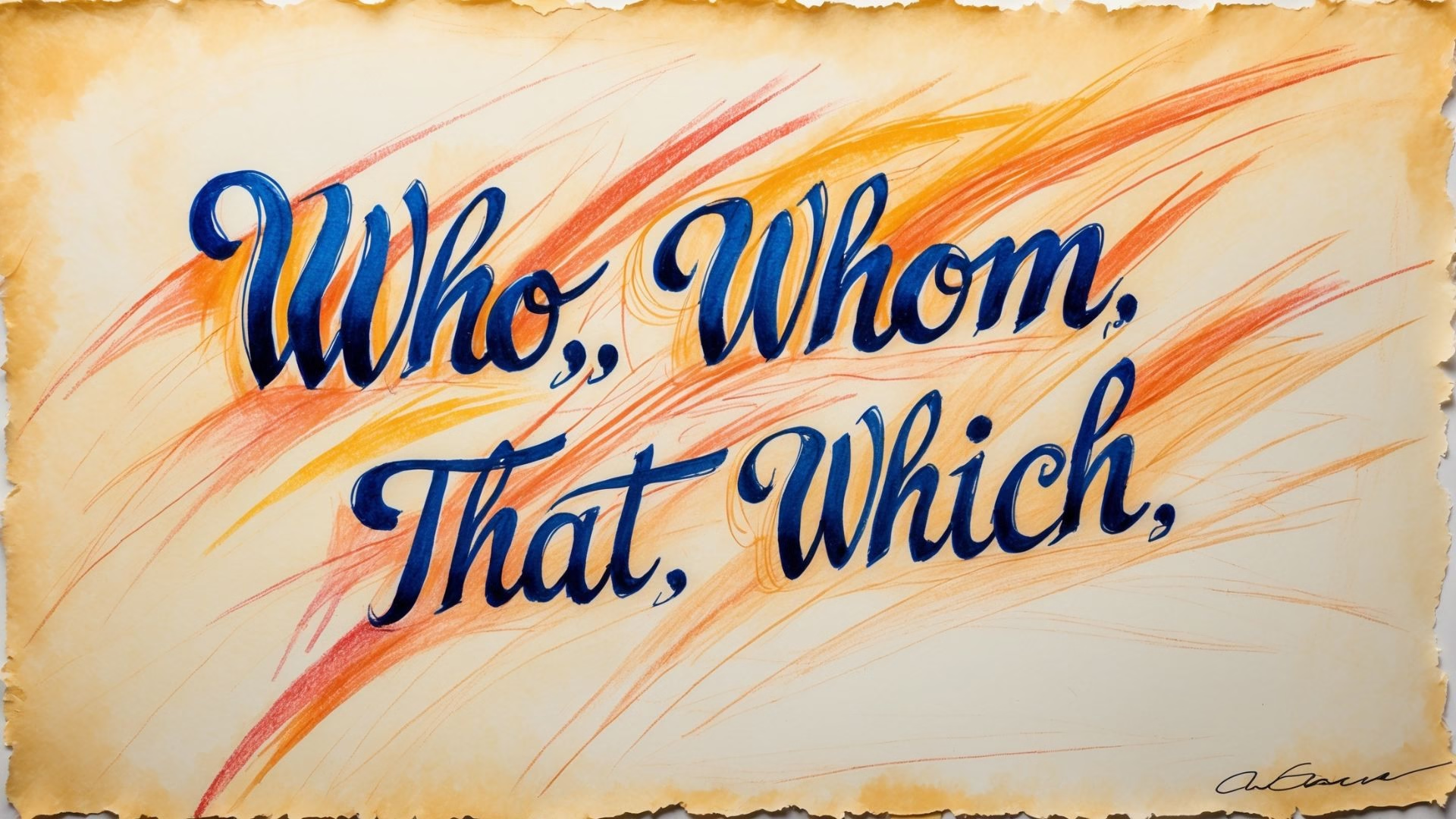Connecting the Dots in Your Sentences
Have you ever wanted to add extra information about someone or something in your sentence without starting a whole new one? That’s where Relative Pronouns come in! Words like who, whom, that, and which act like bridges, connecting a description or extra detail back to a noun mentioned earlier. Mastering them helps you build more complex, sophisticated, and natural-sounding sentences. Instead of short, choppy statements, you can create flowing descriptions and add important context. Let’s explore how these connectors work!
Quick Overview: Meet the Sentence Connectors!
Relative pronouns introduce relative clauses, which are parts of a sentence that describe a noun. Think of them as pointing back to that noun.
- Who: Refers to people (used as the subject of the relative clause). (Example: The woman who works at the bank is very helpful.) -> ‘who’ refers to ‘the woman’, and ‘she’ (the woman) works at the bank.
- Whom: Refers to people (used as the object of the relative clause – more formal). (Example: The man whom I met yesterday called me.) -> ‘whom’ refers to ‘the man’, and ‘I met him‘ (the man).
- Which: Refers to animals or things. (Example: This is the book which won the prize.) -> ‘which’ refers to ‘the book’.
- That: Refers to people, animals, or things (often used in defining/restrictive clauses – more on this later!). (Example: The dog that lives next door barks a lot. The key that I lost was silver.
These little words pack a big punch in making your sentences more informative.
Let’s Dive Deep into Grammar
Building Bridges with Relative Pronouns
Relative pronouns are fantastic tools for making your writing and speaking more fluid and detailed. Let’s break them down based on what we saw in the quiz.
Elementary Level: People vs. Things
- Who = People (Subject): Use who when referring back to a person (or people) who is performing the action in the relative clause.
- The man who lives next door is friendly. (The man lives next door
- Which = Things/Animals: Use which when referring back to an animal or a thing.
- I lost the pen which you gave me. (The pen is a thing
- The cat which sleeps all day is lazy. (The cat is an animal
- That = People or Things (Often Defining):That is very versatile and often used in clauses that are essential to identify the noun (defining clauses).
- The phone that rings constantly is annoying. (Thing
- She is the one that can help. (Person – though who is often preferred
Intermediate Level: Subject vs. Object & Defining vs. Non-Defining
- Who (Subject) vs. Whom (Object – People):
- Use who if the person is the subject within the relative clause. (He/She/They did the action).
- The students who passed the exam cheered. (They passed
- Use whom (more formally) if the person is the object within the relative clause. (The action was done to him/her/them or they follow a preposition).
- The artist whom she admired was famous. (She admired him/her
- The people with whom I traveled were fun. (I traveled with them
- Informal Note: In everyday English, who often replaces whom, and the pronoun might be omitted if it’s the object (e.g., “The artist she admired…”). Using whom correctly shows a good grasp of formal grammar.
- Use who if the person is the subject within the relative clause. (He/She/They did the action).
- Defining (Restrictive) vs. Non-Defining (Non-Restrictive) Clauses:
- Defining: Gives essential information to identify which noun we mean. No commas are used. You can often use that (for things/people) or who (for people) or which (for things).
- The book that/which is on the table is mine. (Tells us which book
- The man who/that called didn’t leave a message. (Tells us which man
- Non-Defining: Gives extra, non-essential information. Commas (or dashes/parentheses) are used to separate it. You MUST use who for people and which for things. You CANNOT use that.
- My brother, who lives in Canada, is visiting soon. (Extra info about my brother
- My favorite chair, which is very comfortable, is in the living room. (Extra info about the chair
- Defining: Gives essential information to identify which noun we mean. No commas are used. You can often use that (for things/people) or who (for people) or which (for things).
Advanced Level: Nuances and Omission
- Preference for Who: Even in defining clauses, who is generally preferred over that when referring to people.
- Formal Whom: Whom is most clearly required after a preposition (to whom, for whom, with whom). When it’s the direct object of the verb, who is very common informally.
- Which for Clauses:Which can sometimes refer back to the whole idea of the previous clause, not just a single noun.
- He arrived late, which annoyed everyone. (‘which’ refers to the act of arriving late
- Omitting the Pronoun: You can often omit the relative pronoun (who, whom, which, that) if it is the object in a defining relative clause.
- The book (that/which) I’m reading is good. (I’m reading it -> object
- The person (who/whom/that) you met is my cousin. (You met him/her -> object
- BUT NOT if it’s the subject: The person who called left a message. (Cannot omit who
Weave Your Sentences Together!
Understanding who, whom, that, and which allows you to connect ideas seamlessly. You can add depth to your descriptions and precision to your statements. Pay attention to whether you’re talking about people or things, whether the pronoun is acting as a subject or object, and whether the information is essential (defining) or extra (non-defining). Practice combining simple sentences using these relative pronouns, and soon you’ll be crafting more complex and elegant English sentences in both your writing and speaking.










0 Comments